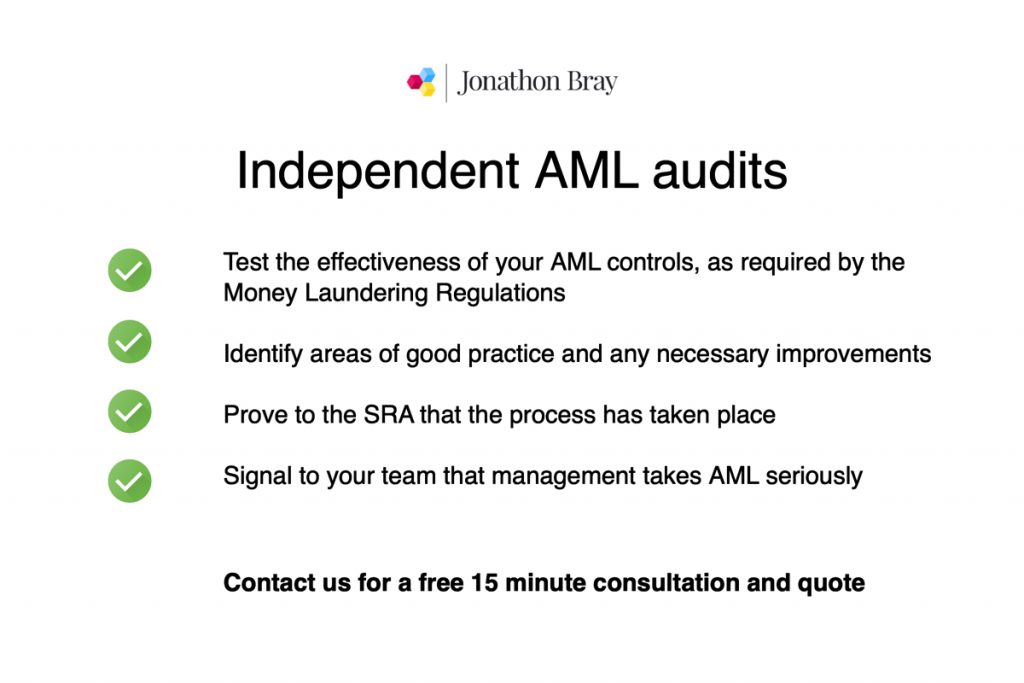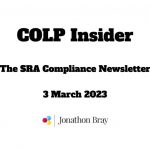LSAG AML guidance updated (March 2023)
The Legal Sector Affinity Group (LSAG) has published a 2023 update to its AML guidance for regulated law firms. Updates of note:
- The discrepancy reporting requirement has been significantly restricted.
- There is a new ‘anti-proliferation financing’ duty.
The guidance is intended to help solicitors and law firms understand their legal obligations under the Money Laundering, Terrorist Financing and Transfer of Funds (Information on the Payer) Regulations 2017.
ICYMI: Sanctions compliance for solicitors: Key considerations
As global sanctions regimes continue to evolve and expand, solicitors and law firms face increasing pressure to ensure that they are in compliance with all applicable regulations. Non-compliance with sanctions can result in significant legal and reputational risks, including fines, legal action, and damage to the firm’s brand and reputation. To avoid these risks, solicitors and law firms must take proactive steps to ensure that they are aware of and compliant with all relevant sanctions regimes.
In this post, we’ll explore some key considerations for solicitors and law firms looking to ensure compliance with sanctions regulations.
Watch recording of sanctions webinar (passcode 9$=nJzA=)
News and Guidance

SRA Updates
- Consultation: Protecting consumers from excessive charges in financial service claims – The SRA is proposing to introduce a cap on the percentage of damages that solicitors can charge as a fee for handling mis-selling claims, such as payment protection insurance (PPI) claims. The proposal is aimed at ensuring that clients are not overcharged for legal services and that solicitors provide clear and transparent information about their fees.
The proposed cap is likely to be set at around 20% of the damages recovered based around defined bandings, with an upper limit of £10,000. The SRA has stated that it will not impose the cap retrospectively.
Consultation responses need to be submitted by 21 June 2023.
- [Updated] Guidance: Publishing complaints procedure – The SRA requires all regulated law firms to have an effective complaints handling procedure in place and to publish details of this procedure on their website.
The guidance, updated to take account of the new Legal Ombudsman scheme, sets out the minimum requirements for the content and accessibility of the complaints procedure, which must include:
- The name and contact details of the person to whom complaints should be addressed
- The steps that will be taken to investigate a complaint
- The timescale for responding to a complaint
- Details of any relevant ombudsman schemes that the complainant may utilise if they are not satisfied with the outcome of the law firm’s investigation.
The guidance also provides template wording and sets out best practice for handling complaints, including the importance of acknowledging and addressing complaints promptly and transparently, and keeping complainants informed of progress throughout the investigation.
- Legal Futures: SRA warns profession: Practising fees will go up this year – Legal Futures reports that the SRA has warned that the cost of practicing fees for solicitors in the UK is set to rise by 4.8% this year.
This increase is intended to cover the cost of implementing a number of regulatory reforms.
The proposed fee increase has been criticized by some members of the legal profession, who argue that it will place an additional financial burden on already struggling law firms. The Law Society has expressed concerns about the timing of the proposed increase, given the ongoing economic uncertainty caused by the COVID-19 pandemic.
The SRA has defended the proposed fee increase, stating that it is necessary to ensure that the regulator can continue to fulfill its obligations and maintain public trust in the legal profession. The SRA has also noted that the proposed increase is lower than the rate of inflation and that it has made efforts to reduce its own operating costs.
The regulator awarded its staff over £500,000 in cost of living payments last year.
Law Society – New and updated practice notes (may require login)
- Gazette: ‘Onslaught’ of extra AML burdens likely to increase – SRA chief – The Chief Executive of the Solicitors Regulation Authority (SRA), Paul Philip, has warned that new anti-money laundering (AML) regulations are likely to increase in the near future. ‘We [the SRA] are piggy in the middle‘, he said.
He anticipates that the Financial Action Task Force (FATF) will revise its AML standards, which may result in more complex regulations for solicitors. Philip also recognised the challenges solicitors face in meeting their AML obligations. He said the SRA is committed to providing support to solicitors in this area, including guidance and training.
- Gazette: Solicitor oath could ensure higher ethical standards – The Law Gazette reports that the Legal Services Board (LSB) Chief Executive, Matthew Hill, has suggested that introducing a solicitor’s oath could help to ensure higher ethical standards in the legal profession in the UK.
According to the article, the idea of introducing a solicitor’s oath has been discussed by legal regulators in the past, but has not been implemented. The proposed oath would be similar to the Hippocratic Oath taken by doctors and would require solicitors to swear to uphold certain ethical principles in their professional practice.
Hill suggests that introducing a solicitor’s oath could help to raise the ethical standards of the legal profession and improve public trust and confidence in the legal system. He notes that the legal profession has faced a number of high-profile ethical scandals in recent years, including the mishandling of client funds and the overcharging of fees.
- Practice note: What to do when a complaint goes to the Legal Ombudsman – The Legal Ombudsman is an independent body that investigates complaints against legal service providers in England and Wales. If a client is unhappy with the service they have received from a solicitor, they can make a complaint to the firm. If the complaint cannot be resolved internally, the client can then escalate it to the Legal Ombudsman for further investigation.
There are a number of steps you should take to prepare and respond to the complaint. The following steps are recommended by the Law Society:
- Acknowledge the complaint: You should acknowledge the complaint promptly, within a maximum of ten days. You should provide the client with details of your complaints procedure and let them know how the complaint will be handled.
- Obtain relevant documents: You should gather all relevant documents and records relating to the matter that is the subject of the complaint. This may include correspondence, notes, and any agreements or contracts between you and the client.
- Investigate the complaint: You should investigate the complaint thoroughly and impartially, reviewing all the relevant documents and records. You should also speak to anyone involved in the matter and consider any evidence that may support or refute the complaint.
- Respond to the complaint: You should respond to the complaint within a maximum of eight weeks from the date of the Legal Ombudsman’s notification, providing a full explanation of your position and addressing any specific concerns raised by the client.
- Consider settlement: You should consider whether the complaint can be resolved through settlement or alternative dispute resolution, such as mediation. If you reach a settlement with the client, you should document the terms of the settlement and obtain the client’s agreement.
- Co-operate with the Legal Ombudsman: You should co-operate fully with the Legal Ombudsman’s investigation and provide any information or assistance that is required. You should also comply with any directions or recommendations made by the Legal Ombudsman in relation to the complaint.
- Tools: Welfare benefits – Legal aid deserts – Data analysis showing that 84% of people in England and Wales do not have access to welfare legal aid lawyers.
- Tools: Anti-corruption training – Links to free training resources.
- Q&A: How do I confirm qualifying work experience? – The SRA requires that individuals who wish to qualify as a solicitor through the SQE route complete a certain amount of qualifying work experience (QWE). This Q&A sets out how the QWE should be verified by a COLP or practising solicitor.
- Q&A: A client file is missing. What should I do? – Solicitors must keep accurate and up-to-date records of their clients’ files, which should be stored securely and accessible only to authorised personnel. If a client file goes missing, this Q&A advises that a complaint or negligence claim may result, so insurers may need to be involved.
From a practical point of view, we suggest that you:
- Check the office thoroughly to see if the file has been misfiled or misplaced.
- Review any relevant logs or records to see if the file has been moved to a different location.
- Contact any personnel who may have had access to the file to see if they know its whereabouts.
- Inform the client of the situation and explain what steps are being taken to locate the file.
- If the file cannot be found, notify the client in writing and offer to provide copies of any documents that are still in your possession.
- If the missing file is likely to contain confidential or sensitive information, consider whether any further action is necessary to protect the client’s interests, and whether regulatory reports may be necessary (SRA, ICO).
- If the missing file is related to ongoing legal proceedings, the solicitor may have to inform the court.
Other Updates
- Legal Services Board: Chair’s blog – The recent Legal Services Board (LSB) meeting discussed several areas of policy development.
Notably the LSB decided that the time is not right to revisit the reserved legal activities contained in the Legal Services Act 2007, a view endorsed by the Law Society President.
The Board also endorsed the Legal Services Consumer Panel’s workplan for 2023/24 and discussed how it could contribute to supporting performance monitoring of the regulators under the performance framework. They scrutinised and approved the Office for Legal Complaints’ final budget proposals for 2023/24 and discussed the need to maintain momentum in 2023/24.
- HMRC: Trust or company service provider guidance for money laundering supervision – Official guiidance document on anti-money laundering for trust or company service providers (TCSPs). This document provides guidance for businesses that provide trust or company services in the UK on how to comply with anti-money laundering regulations.
The LSAG guidance is the primary source of AML guidance for UK lawyers. However, this TCSP guidance may supplement LSAG for those firms doing TCSP work (including: undertaking professional trusteeships, providing registered office addresses to clients, and setting up companies and trusts).
The guidance covers a wide range of topics related to anti-money laundering, including risk assessments, customer due diligence, record-keeping, and reporting suspicious activity. It also provides information on the legal and regulatory framework that governs anti-money laundering in the UK.
- Data Protection: ICO takes action against Lewisham Council for failing to respond to hundreds of Freedom of Information requests – The ICO has taken action against Lewisham Council for failing to respond to hundreds of Freedom of Information (FOI) requests, following 300 complaints.The ICO conducted an investigation into the council’s practices and found that it had breached its obligations under the Freedom of Information Act. As a result, the ICO has issued an enforcement notice requiring the council to take steps to improve its handling of FOI requests and respond to outstanding requests within a set timeframe. The council has also been ordered to pay a fine of £25,000.
Free webinars

Webinar recording: Sanctions compliance – one year on
Thanks to everyone who attended this free session on Wednesday. In case you missed it, we covered:
- the sanctions regimes and how they apply to law firms,
- who you should conduct due diligence on and how,
- exemptions,
- updated SRA/Law Society guidance, and
- professional duties
Watch and download the recording here (passcode 9$=nJzA=)
Slides here
SRA and SDT disciplinary decisions

- Andrew Egerton – rebuked for overseeing a £24,000 client account shortfall and failure to properly maintain books of account.
- Rajiv Chopra – rebuked for sending an email which was ‘offensive, derogatory and inappropriate in nature, tone and content‘.
- Caroline Adams – rebuked for drink driving offence.
- Canan Oztas – costs negotiator (non-lawyer) banned from the profession for misappropriating over £700,000 meant to pay fees and disbursements.
- Aaron Jamieson – non-lawyer banned from the profession for fare dodging.
- Andrew James Thomas – ABS owner (non-lawyer) banned from the profession for falsifying a solicitor’s signature and pretending to be a solicitor on the telephone.
- Sheikh Asif Salam – immigration lawyer struck off after being secretly filmed giving advice to an undercover journalist on how to evidence a spouse visa with false information.
- Mazamal Ali Sharif – bookkeeper banned from the profession after misappropriating over £300,000 of client and office money.









